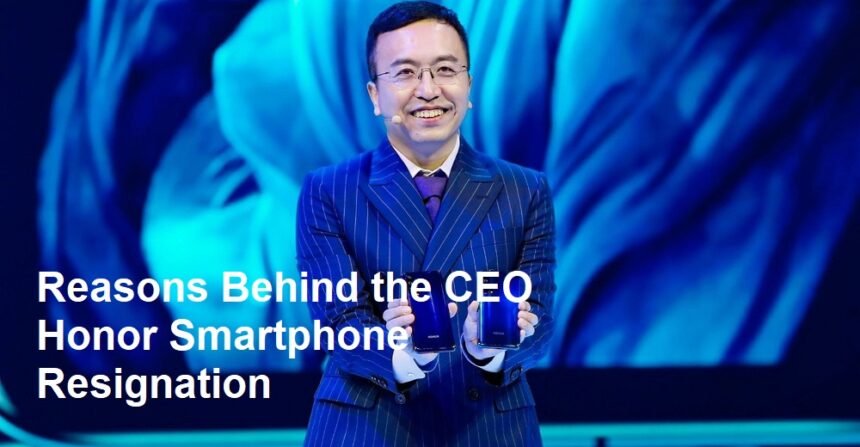In a surprising move, the CEO of Honor, the Chinese smartphone brand, has announced his resignation, leaving the tech world speculating about the future direction of the company. Honor, which was originally a sub-brand of Huawei, has grown into a major player in the global smartphone market, known for its innovative devices and strong performance in markets like China, Europe, and the Middle East. The resignation of the CEO comes at a crucial time for the company, which is navigating complex challenges in the highly competitive smartphone industry. This article explores the reasons behind the resignation, the potential impact on Honor, and what the future might hold for the brand.
The Background of Honor’s Leadership Change
Honor was originally created by Huawei in 2013 as a way to cater to the younger, more budget-conscious segment of the smartphone market. Under Huawei’s umbrella, Honor rapidly gained traction and became known for offering high-quality smartphones at more affordable prices. However, in 2020, due to the mounting pressure from U.S. sanctions placed on Huawei, the company decided to sell Honor to a consortium of Chinese companies, including the Shenzhen government. This move was aimed at saving Honor from the negative consequences of the U.S. government’s restrictions on Huawei, which had limited the company’s access to critical technologies like Google services and components from U.S. suppliers.
Since its spin-off, Honor has operated as an independent entity, with a goal of regaining market share and establishing itself as a global smartphone brand. The company has made significant strides in this direction, launching a series of successful devices and maintaining a strong presence in various markets. However, the resignation of its CEO has raised questions about the company’s leadership during this pivotal phase.
Reasons Behind the CEO’s Resignation
While the specific reasons for the CEO’s resignation have not been fully disclosed, there are several potential factors that could have influenced the decision. The smartphone industry is highly competitive, with brands like Apple, Samsung, and Xiaomi dominating the global market. Honor, despite its impressive progress since becoming an independent company, still faces stiff competition from these industry giants, particularly in key markets like Europe and Asia.
Moreover, Honor has been navigating the aftermath of Huawei’s involvement, and the company continues to face challenges related to access to key technologies, such as 5G chips and Google’s Android operating system. Although Honor has been able to strike partnerships with other suppliers, it still does not have the same level of technological freedom that it once enjoyed under Huawei. This ongoing struggle to build a competitive product lineup without the support of Huawei’s vast resources could have put additional pressure on the company’s leadership.
The resignation could also signal internal changes or restructuring within the company. It’s possible that the CEO’s departure was a result of differences in strategy or the need for fresh leadership to guide Honor through its next phase of growth. With the fast pace of technological innovation and the rapidly evolving market demands, leadership changes in tech companies are not uncommon, especially when there is a need to recalibrate the company’s approach to innovation or market positioning.
The Impact of the Resignation on Honor
The departure of a CEO is always a significant event for any company, particularly for a tech brand like Honor, which is still in a phase of recovery and growth following its split from Huawei. In the short term, the resignation could create uncertainty both within the company and among its partners, investors, and consumers. The CEO plays a crucial role in shaping the strategic direction of the company, and his departure could lead to questions about Honor’s future plans.
For consumers, the resignation could signal potential shifts in product development, brand positioning, or marketing strategies. Honor’s smartphones have been well-received for their value proposition, but without clear leadership, the brand might struggle to maintain momentum and continue to differentiate itself in a crowded marketplace. Additionally, if Honor’s future leadership changes the company’s approach to design or pricing, it could impact customer loyalty and trust, especially if the brand shifts too far from what has made it successful thus far.
From a broader industry perspective, the resignation could indicate that Honor is preparing for a strategic shift, perhaps even considering new partnerships or a re-evaluation of its product lineup. The global smartphone market is undergoing rapid changes, with the rise of new technologies like foldable screens, AI-powered features, and 5G networks. Honor will need strong leadership to navigate these changes and continue to innovate in ways that appeal to tech-savvy consumers.
What’s Next for Honor?
Looking forward, Honor’s next steps will depend largely on the company’s ability to maintain its competitive edge and adapt to the changing landscape of the smartphone market. It is likely that Honor will continue to focus on delivering high-quality smartphones at competitive prices, particularly targeting markets where it has already gained significant traction, such as in Europe and China.
The company will also need to strengthen its relationships with suppliers and partners to ensure access to the latest technologies. Honor has already made efforts to diversify its supply chain by partnering with non-U.S. companies, but securing long-term partnerships for critical components and software services remains essential for the brand’s future success.
Additionally, Honor may look to expand into new product categories, such as wearables, smart home devices, or even electric vehicles, as many smartphone brands are diversifying their portfolios. With the right leadership, Honor could position itself as more than just a smartphone maker, further solidifying its place in the global tech ecosystem.
The resignation of the CEO of Honor marks a significant moment for the brand, which is still in the process of establishing itself as an independent force in the smartphone industry. While the reasons behind the departure remain unclear, it’s evident that Honor will need strong leadership to navigate the challenges ahead. The company’s future will depend on its ability to continue innovating and adapting to the fast-changing tech landscape, all while maintaining the trust and loyalty of its consumers. As Honor moves forward, all eyes will be on the brand’s next steps and its ability to thrive in an increasingly competitive global market.













